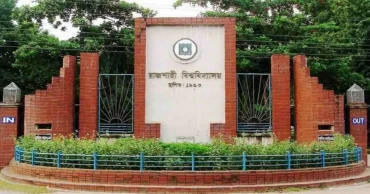conference
Tarique cites Prophet’s ideals, seeks Islamic scholars’ support for BNP
Stating that the justice and fairness, inspired by the ideals of Prophet Muhammad (SM), will guide his party’s governance if it returns to power, BNP Acting Chairman Tarique Rahman on Sunday (November 23) sought support from imams, khatibs, muezzins and Islamic scholars for his party in the next national election.
“There was never any doubt about the Greatest Prophet’s fairness. InshAllah, BNP’s guiding principle in governing the country will be justice and fairness, upholding the Prophet’s ideals,” he said.
Speaking virtually at the National Conference of the Sammilito Imam-Khatib, the BNP leader also said his party wants to build an equitable Bangladesh based on justice inspired by the Prophet’s teachings.
“BNP seeks the prayers and support of all respected imams, khatibs, muezzins, Islamic scholars, alems and pir-mashaikh of the country in the upcoming election to build such a Bangladesh,” he said.
The BNP leader urged Islamic scholars and ulema to pray for his mother, Begum Khaleda Zia, for the leaders, workers and supporters of BNP, and for the people of the country.
Don’t exploit July-August uprising for political gain: Salahuddin
“May Allah grant me and our party the chance to carry out every righteous deed for the welfare of the nation and its people. For this, I seek your prayers, support and cooperation,” he added.
The conference, organised by the Sammilito Imam-Khatib Parishad, was held at the Bangladesh–China Friendship Conference Centre. Mufti Azharul Islam, the member-secretary of the conference committee, presented the seven-point demands of the imams and khatibs at the programme.
Tarique said the long one-and-a-half decades of Awami League’s oppressive rule once again proved that to protect religious faith, Islam, and the country’s independence and sovereignty, there is no alternative to unity. “So, the upcoming national election is extremely important and significant for consolidating the freedom of the country and its people,” he said.
Tarique recalled that during the BNP government in 1993, mosque-based child and mass education programmes were introduced for the first time in the country and continue to this day.
He said BNP also plans to involve imams and muezzins in future disaster prevention programmes and local development activities across all districts and upazilas.
Fakhrul warns Jamaat against ‘misleading people’ by linking votes with ‘Jannat’
The BNP leader praised imams, khatibs and muezzins for their role as social reformers, saying, “Despite limitations, you have devoted your time to the moral and spiritual upliftment of society. BNP believes it is the state’s responsibility to provide financial support to those who are struggling.”
“I believe there is every possibility of fulfilling several of the demands you have presented on a priority basis. You have called for the formulation of service rules for imams, khatibs, and muezzins. This is a very logical demand,” he said.
In many mosques, Tarique said, the employment of imams and muezzins depends on the personal preferences of mosque committees.
“I think this should not happen…I consider this an unfair practice against imams and muezzins. If the BNP gets the opportunity to govern the state, we will take priority measures to introduce service rules for you. The BNP government will also take effective initiatives to implement the other demands that have been presented,” he said.
The BNP leader also urged the imams and khatibs to form multiple committees and submit specific recommendations on each of the demands to the BNP.
Bangladesh can't progress without women’s safety online and offline: Tarique Rahman
Tarique also highlighted his party’s commitment to strengthening the Imam-Muezzin Welfare Trust and implementing projects to make mosque personnel more self-reliant.
“Guided by Islamic values, the BNP believes in a welfare-oriented society and state where Muslims can live according to the Qur’an and Sunnah without fear, and practise their religious duties safely and confidently,” he said.
At the same time, the BNP leader said, people of other faiths will also be free and secure in practising their own religions and cultures. “The BNP has never compromised on the core principles or beliefs of Islam, and, InshaAllah, never will.”
He said after independence, the Awami League drafted the constitution to suit their own interests, ignoring the aspirations of the majority.
When BNP founder President Ziaur Rahman later took charge, Tarique said he added ‘Bismillahir Rahmanir Rahim’ to the constitution and affirmed trust and faith in Almighty Allah. “The phrase ‘trust and faith in Almighty Allah’ is no longer kept in the constitution in its original form. Why has it been changed? I place this question before you today.”
Bhasani a lasting inspiration for democracy, rights: Tarique
He said the BNP has always spoken out against any activity harmful to Islam or the interests of Muslims. “The fallen autocrat repeatedly tried to undermine Islam and Islamic culture in the state and society.”
In 2013, Tarique said, during the crackdown on thousands of Hefazat-e-Islam supporters at Shapla Chattar, the BNP stood by them and observed two days of hartal nationwide in protest against the massacre.
He said there are around 350,000 mosques in the country, where nearly 17 lakh imams, khatibs and muezzins serve. “Sustainable development is not possible while excluding lakhs of imams, khatibs, muezzins and madrasa students from national development activities.”
Speaking at the programme, BNP Standing Committee member Salahuddin Ahmed said if the BNP returns to power, no law will be enacted that goes against the Qur’an and Sunnah, and any such existing laws will be repealed.
The BNP leader said President Ziaur Rahman had inserted ‘Bismillahir Rahmanir Rahim’ into the constitution’s preamble, but it is no longer there, and the BNP will restore it in the future.
Khaleda admitted to Evercare Hospital with chest infection
3 months ago
PM Hasina off to Germany to attend Munich Security Conference
Bangladesh's Prime Minister Sheikh Hasina left here for Germany on Thursday (February 15, 2024) morning on a three-day official visit to attend the Munich Security Conference.
This is her first official tour abroad since being re-elected as the prime minister for the fourth consecutive term in last month's parliamentary polls.
The Munich Security Conference is considered the world's leading forum for debating security issues.
Read: Govt measures to tame inflation soon: PM tells Parliament
A flight of the Biman Bangladesh Airlines departed Hazrat Shahjalal International Airport at 11 am carrying the prime minister and her entourage members.
During her stay in Munich from February 16-18, Sheikh Hasina will also hold meetings with German chancellor, Ukraine's president, prime ministers of Denmark and the Netherlands on the sidelines of the security conference.
Indian external affairs minister will also call on the Bangladesh prime minister.
Read more: Focus on rural dev along with infrastructure: PM Hasina tells ECNEC
2 years ago
RU to hold Int’l conference on Science and Technology in October
An international conference on the "Role of Science and Technology in the Fourth Industrial Revolution" will be held at Rajshahi University from October 5-6,
The conference will be organised by the university's Faculty of Science, it informed through a press release on Thursday.
Sumon, Faraque elected as ERAB president, general secretary
State Minister for Planning Shamsul Alam will attend the opening ceremony as the chief guest. Rajshahi University pro-vice-chancellor Prof Sultan-ul-Islam and Prof Humayun Kabir will be present as special guests and Vice-Chancellor Prof Golam Sabbir Sattar will preside over the event.
According to the press release, researchers from different universities in Bangladesh will present their work at the conference. Researchers from different parts of the world will also attend the conference.
Community Digital Storytelling workshop held at Islamic University
Key figures from Finland, Japan, India, Australia, China, and Nepal will serve as international advisory members. Apart from the science faculty, renowned people from various institutions in the country will play a role as members of the organising committee.
There will be three keynote speakers in the event. They are Vice-Chancellor of Pondicherry University of India, Dr Gurmeet Singh; Managing Director of Bangladesh Data Soft Systems Limited, Mahbub Zaman; and CEO of Wenrich International, Japan, Uchy Harley Ichihasi, said the release.
10 students receive Sitara Parveen Award for academic excellence in DU’s journalism discipline
This international conference will play an essential role in improving the image of the university and the country. Already, 370 researchers have submitted their research. This number will increase. Registration can be done until September 30. Tk 3,000 for professionals and Tk 1,500 for students have been fixed for the registration, it added.
2 years ago
6th Indian Ocean Conference in Dhaka: Bangladesh, India committed to an 'open, inclusive, rules based' IOR
The Indian Ocean Region (IOR) is no longer an idea based on "power equations", but rather a natural construct based on principles of “inclusivity, comradery, and multi-stakeholderism,” says a document related to the 6th Indian Ocean Conference being held in Dhaka on May 12, 13.
As two responsible states, Bangladesh and India are committed to ensure the rise of a “free, open, inclusive and rules based” IOR, according to the concept note of the conference.
The global order is rapidly evolving, power axis is shifting, and the complacency of the past is making way for greater confidence in future, the document reads.
The IOR has emerged as a microcosm of partnerships, collaborations, bilateral and multilateral dependence.
Also read: Indian Ocean Conference in Dhaka on May 12-13: Myanmar not invited
Mauritius President Prithvirajsing Roopun, minister- and state minister-level delegations from 25 countries including Indian External Affairs Minister S. Jaishankar will attend the conference.
Prime Minister Sheikh Hasina will inaugurate the conference at a Dhaka hotel on May 12. The Prime Minister will also host a dinner in honour of the guests.
The 6th edition of the conference is being organised by India Foundation in association with the Ministry of Foreign Affairs, Government of Bangladesh.
Home to the most promising economies, the most populous lands, and the most vulnerable islands, the Indian Ocean Region is a testimony to the multifaceted challenges impacting governance in the 21st century.
Read More: Bangladesh urges Indian Ocean nations to work together to promote blue economy
With a vast reserve of natural resources and supply chain trade routes, the IOR has become an integral part of global strategic thinking.
From Europe to America and Japan to South Korea, all major powers have aligned their global strategic outreach in line with the vision of developing a Free and Open Indo-Pacific Region (FOIP).
With a vision towards mutual growth, prosperity and strengthening of the international community, the 6th IOC will bring together stakeholder nations to discuss and deliberate on the theme of “Peace, Prosperity, and Partnership” for a resilient future.
In light of recent developments, the global community appreciates the expansion of resilience to go beyond economic strength and military might to include in its ambit the challenges posed by rapid climatic deterioration, and the exponential rise of disruptive technologies.
Read More: Ocean health needs proper regional, global attention: Dhaka
Peace
While the expanse of the IOR makes it a region of infinite potential, it is the same expanse that can lead to damages of unfathomable scale. The region today is faced with not just traditional challenges of security but also non-traditional challenges of biohazards, cyberwarfare, and maritime piracy. The after-effects of such a disruption are unimaginable.
Thus, maintaining peace in the region is of paramount importance to ensure the rise of a resilient future. Rise of a peaceful IOR on the principles of a rules-based order will chart a new agenda for prosperity and greater partnership in the region and beyond.
Prosperity
The IOR is pegged to rise as the most economically prosperous region of the century. It has the economies of scale, mass consumer market, and technical prowess to lead the world into an era of global affluence based on the ethos of sustainable development.
The region is home to 3 of the 5 fastest growing economies of the world, 64% of the global population, and 60% of the global GDP while also accounting for 40% of the world’s oil supply and 64% of oil trade.
Read More: President of Mauritius in Dhaka to attend 6th Indian Ocean Conference, bilateral programmes
As two stakeholder nations of the region, both India and Bangladesh have been traditional advocates of responsible growth and development while living in harmony with nature.
Pushing forth the ethos of a lifestyle based on sustainable development, taking climate conscious decisions ranks high on the prosperity agenda of the IOR.
Partnerships
One lesson that the pandemic taught the world is the importance of collaborative approach to working. Partnerships in the IOR will thus be more forward looking and constructive in their scope.
With greater innovation, ample opportunities are opening up for countries to collaborate in multiple formats on carbon planning and green financing, navigating technological hegemony, the development of the blue economy, the rise of alternate forms of financing, and collaboration on public healthcare and education.
Read More: Maritime cooperation in Indian Ocean increasingly important in current geopolitical landscape: Discussants
Foreign Minister Dr AK Abdul Momen said Bangladesh's partnership with countries in the Indian Ocean will become stronger through hosting the IOC.
External Affairs Minister of India Dr S. Jaishankar will deliver the keynote address of the evening alongside special addresses by the US Deputy Secretary of State, Wendy Sherman, and Vice President of Maldives Faisal Naseem.
The inaugural session will also be graced by the presence of Foreign Minister Dr Momen and Foreign Minister of Oman Sayyid Badr bin Hamad bin Hamood Albusaidi.
The Foreign Minister of Singapore Dr Vivian Balakrishnan will be represented by Dr Maliki Osman, Minister in the Prime Minister's Office and Second Minister of Foreign Affairs of Singapore.
Official delegations led by heads of states/governments, deputy heads, cabinet ministers, deputy ministers and senior officials from 27 countries and multilateral organisations will address the conference on May 13.
Read More: PM to inaugurate Indian Ocean Conference in Dhaka May 12
The Indian Ocean Conference (IOC) was started in 2016 and in the last six years it has emerged as the "flagship consultative forum" for countries in the region on regional affairs.
The conference endeavours to bring critical states and principal maritime partners of the region together on a common platform to deliberate upon the prospects of regional cooperation for Security and Growth for All in the Region (SAGAR).
The first edition of the Indian Ocean Conference was held in Singapore in 2016.
2 years ago
Indian Ocean Conference in Dhaka on May 12-13: Myanmar not invited
Bangladesh's partnership with countries in the Indian Ocean will become stronger through hosting the Indian Ocean Conference (IOC) in Dhaka on May 12-13, Foreign Minister Dr AK Abdul Momen said on Wednesday.
Mauritius President Prithvirajsing Roopun, minister and state minister-level delegation from 25 countries including Indian External Affairs Minister S. Jaishankar will attend the conference.
Briefing reporters at the Ministry of Foreign Affairs, Dr Momen also said around 150 foreign guests will participate in the conference including representatives from D8, SAARC and BIMSTEC.
The participating ministers will also visit Bangabandhu Memorial Museum at Dhanmondi 32 to pay respect to the Father of the Nation Bangabandhu Sheikh Mujibur Rahman.
State Minister for Foreign Affairs Md Shahriar Alam said Bangladesh maintains good relations with Mauritius and the relations will further strengthen through the visit of the country's president.
Responding to a question, Dr Momen said Myanmar was not invited to the conference.
Prime Minister Sheikh Hasina will inaugurate the conference at a Dhaka hotel on May 12. The Prime Minister will also host a dinner in honour of the guests.
The 6th edition of the conference is being organised by India Foundation in association with the Ministry of Foreign Affairs, Government of Bangladesh.
With the theme of “Peace, Prosperity and Partnership for a Resilient Future”, the conference would bring together a luminary gathering of key stakeholders to chart the roadmap for strengthening the Indian Ocean Region.
External Affairs Minister of India Dr S. Jaishankar will deliver the keynote address of the evening alongside special addresses by the Deputy Secretary of State of USA Wendy Sherman and Vice President of Maldives Faisal Naseem.
The inaugural session will also be graced by the presence of Foreign Minister Dr Momen and Foreign Minister of Oman Sayyid Badr bin Hamad bin Hamood Albusaidi.
The Foreign Minister of Singapore (Dr Vivian Balakrishnan) will be represented by Dr Maliki Osman, Minister in the Prime Ministers' Office and Second Minister of Foreign Affairs of Singapore.
Official delegations led by Heads of State/Government, Deputy Heads, Cabinet Ministers, Deputy Ministers and Senior Officials from 27 countries and multilateral organisations will address the conference on May 13.
The conference will also bring together a gathering of over 300 social and corporate leaders, policy practitioners, scholars, professionals and media personnel from over 40 countries.
The Indian Ocean Conference (IOC) was started in 2016 and in the last six years it has emerged as the "flagship consultative forum" for countries in the region on regional affairs.
The conference endeavours to bring critical states and principal maritime partners of the region together on a common platform to deliberate upon the prospects of regional cooperation for Security and Growth for All in the Region (SAGAR).
The first edition of the conference was held in Singapore in 2016.
It was attended by over 300 delegates from 22 countries including ministers, political leaders, diplomats, strategic thinkers, academics, and media.
2 years ago
PM in Doha: LDCs need 5 key support from dev partners
Bangladesh's Prime Minister Sheikh Hasina today (March 06, 2023) sought five key support from development partners to ensure a smart, innovative and knowledge-based society that will help to promote peace and inclusivity.
The prime minister made the call at a side event, titled “Investment in Research and Development in LDCs for Smart and Innovative Societies”, at the 5th UN LDC Conference held at Qatar National Convention Center.
Read More: LDC5 Conference: PM Hasina leaves Dhaka for Doha
The key supports are:
1. Provide appropriate incentives to the international private sector for impactful technology transfer to LDCs, including for climate action.
2. Invest in digital infrastructures to reduce broadband divide and tech discrimination in LDCs.
3. Foster collaboration among research professionals and institutes to address issues and challenges facing LDCs.
4. Continuation of LDC waivers under TRIPS Agreement, also beyond graduation, especially for pharmaceuticals and agro-chemicals.
5. Support in developing an intellectual property regime conducive to both innovation and development in LDCs.
Read more: Bangladesh open to Qatar’s investment in energy sector: PM tells Doha Investment Summit
She also apprised the participants of her goal to go much further, to the next vision — ‘Smart Bangladesh’ by 2041.
“It will be based on four core elements: Smart Citizen, Smart Government, Smart Society and Smart Economy,” she said.
Sheikh Hasina said that in 2009, when her government made a pledge to the people to build a ‘Digital Bangladesh’ by 2021, at the time, it sounded like a tall order.
“But, the Covid-19 pandemic proved that we could fulfill that pledge.”
Read More: Graduating LDCs want to make sure growth momentum isn’t slowed down: PM in Doha conference
She said that the pandemic reminded all that LDCs cannot wait to invest in scientific research and technological innovation.
“Such investments are a must for advancing their economies through productive capacity building,” she said.
She mentioned that LDCs average GDP expenditure for research and development still remains below 0.6 percent. Only a handful of them feature in the Global Innovation Index.
“But, LDCs cannot afford to lag behind with the advent of the Fourth Industrial Revolution. Our young people should be made part of the future of work. We need meaningful global partnership for that,” she said.
Read More: Private sector should prepare to face challenges of LDC graduation, FBCCI president says at AGM
Sheikh Hasina said that Bangladesh qualified for LDC graduation in 2021 under all three criteria.
“We are now preparing for graduation in 2026. During this transition, investment in science, technology and innovation is a priority for our government. We are working with the UN Technology Bank for LDCs on a national needs assessment,” she said.
She said that the government attaches importance to promoting a scientific mindset in the education system.
“We have established a host of science and technology universities and specialized institutes around the country,” she said.
Read More: Switzerland to work with all Bangladeshi stakeholders for a ‘smooth, inclusive, sustainable’ LDC graduation
Sheikh Hasina said that the government has introduced the Bangabandhu Science and Technology Fellowship and National Science and Technology Fellowship.
The PM said that the new focus on blended education is aimed at developing IT skills for all.
In this regard, she said that Sheikh Russel Digital Labs and Schools of Future are being set up across educational institutions. Bangladesh now has the world’s second largest community of registered IT freelancers. A new Institute of Frontier Technology is in the making for supporting high-end research and development.
She mentioned that following the launch of Bangabandhu-I communication satellite, the government is now planning for an earth observation satellite.
Read More: PM Sheikh Hasina arrives in Qatar to join UN conference on LDCs
“Bangladesh had to invest in improving early warning and weather forecast systems to drastically reduce natural disaster risks,” she added.
Sheikh Hasina said that the government has worked on home-grown climate adaptation measures, including through technological applications.
“We also need access to mitigation technologies to further curb greenhouse gas emissions. Our government is building two nuclear power plants as part of a clean energy transition. We aim to increase our share of renewable energy, preferably with floating solar panels, offshore wind turbines and green hydrogen.”
She said that the government has given emphasis on supporting agricultural research which made it possible for Bangladesh to combat hunger and become largely food secure.
Read More: Int'l community must renew commitment for real structural transformation in LDCs: PM in Doha conference
“We are investing further in making our agriculture and livestock environment-friendly. We stand ready to share our good practices with other LDCs through various means, including contract farming.”
Talking about the government's present focus on enhancing scope for medical research, she said, climate change’s impacts on public health are being manifested through new disease burdens.
“We must have international collaboration for research in neglected tropical diseases. We urgently need investments in developing new treatments for antimicrobial resistance,” the PM said.
2 years ago
DC conference starts Tuesday
The three-day annual conference of the Deputy Commissioners (DCs) will begin on Tuesday (January 24, 2023).
Prime Minister Sheikh Hasina is scheduled to open it at 10 am at Shapla Hall in the Prime Minister’s Office (PMO), said Cabinet Secretary Mahbub Hossain while briefing reporters at the Secretariat.
This time there will be a total of 26 sessions, including 20 working sessions, with various ministries in the DC conference that will end on Thursday (January 26, 2023).
On this occasion, the DCs will meet the President, the Chief Justice and the Speaker and take instructions from them, said the cabinet secretary.
Also Read: DCs asked to take steps against brick kilns
In the conference the deputy commissioners will exchange views with the relevant ministries for the implementation of various policies, strategies and instructions of the government, he said.
Secondly, they come up with various reform proposals based on the challenges they face, the experience they accumulate at the field level while implementing the government's various directives and policies, Mahub said.
“We have received a total of 245 proposals from various ministries and deputy commissioners this year,” he added.
In response to a question regarding the next national election, he said, “We will provide full cooperation for holding a fair election. We hope that new momentum will come in our field level activities through this year's DCs Conference.”
3 years ago
Historic biodiversity agreement reached at U.N. conference
Negotiators reached a historic deal at a U.N. biodiversity conference early Monday that would represent the most significant effort to protect the world’s lands and oceans and provide critical financing to save biodiversity in the developing world.
The global framework comes a day before the United Nations Biodiversity Conference, or COP15, is set to end in Montreal. China, which holds the presidency at this conference, released a new draft earlier in the day that gave the sometimes contentious talks much-needed momentum.
The most significant part of the agreement is a commitment to protect 30% of land and water considered important for biodiversity by 2030. Currently, 17% of terrestrial and 10% of marine areas are protected.
“There has never been a conservation goal globally at this scale,“ Brian O’Donnell, the director of the conservation group Campaign for Nature, told reporters. “This puts us within a chance of safeguarding biodiversity from collapse ... We’re now within the range that scientists think can make a marked difference in biodiversity.”
The draft also calls for raising $200 billion by 2030 for biodiversity from a range of sources and working to phase out or reform subsidies that could provide another $500 billion for nature. As part of the financing package, the framework calls for increasing to at least $20 billion annually by 2025 the money that goes to poor countries — or about double what is currently provided. That number would increase to $30 billion each year by 2030.
Some advocates wanted tougher language around subsidies that make food and fuel so cheap in many parts of the world. The document only calls for identifying subsidies by 2025 that can be reformed or phased out and working to reduce them by 2030.
Read: UN chief appeals for more fund from developed countries to help preserve biodiversity
“The new text is a mixed bag,” Andrew Deutz, director of global policy, institutions and conservation finance for The Nature Conservancy, said. “It contains some strong signals on finance and biodiversity but it fails to advance beyond the targets of 10 years ago in terms of addressing drivers of biodiversity loss in productive sectors like agriculture, fisheries, and infrastructure and thus still risks being fully transformational.”
The ministers and government officials from about 190 countries have mostly agreed that protecting biodiversity has to be a priority, with many comparing those efforts to climate talks that wrapped up last month in Egypt.
Climate change coupled with habitat loss, pollution and development have hammered the world’s biodiversity, with one estimate in 2019 warning that a million plant and animal species face extinction within decades — a rate of loss 1,000 times greater than expected. Humans use about 50,000 wild species routinely, and 1 out of 5 people of the world’s 8 billion population depend on those species for food and income, the report said.
But they have struggled for nearly two weeks to agree on what that protection looks like and who will pay for it.
The financing has been among the most contentions issues, with delegates from 70 African, South American and Asian countries walking out of negotiations Wednesday. They returned several hours later.
Brazil, speaking for developing countries during the week, said in a statement that a new funding mechanism dedicated to biodiversity should be established and that developed countries provide $100 billion annually in financial grants to emerging economies until 2030.
Read: UN chief calls for greater ambition to reverse biodiversity loss
“All the elements are in there for a balance of unhappiness which is the secret to achieving agreement in U.N. bodies,” Pierre du Plessis, a negotiator from Namibia who is helping coordinate the African group, told The Associated Press. “Everyone got a bit of what they wanted, not necessarily everything they wanted. Let’s see if there is there is a spirit of unity.”
Others praised the fact the document recognizes the rights of Indigenous communities. In past biodiversity documents, indigenous rights were often ignored and they rarely were part of the larger discussions other than a reference to their traditional knowledge. The framework would reaffirm the rights of Indigenous peoples and ensure they have a voice in any decision making.
“It’s important for the rights of Indigenous peoples to be there, and while it’s not the exact wording of that proposal in the beginning, we feel that it is a good compromise and that it addresses the concerns that we have,” Jennifer Corpuz, a representative of the International Indigenous Forum on Biodiversity said. “We believe that it’s a good basis for us to be able to implement policy at the national level.”
But the Wildlife Conservation Society and other environmental groups were concerned that the draft puts off until 2050 a goal of preventing the extinction of species, preserving the integrity of ecosystems and maintaining the genetic diversity within populations. They fear that timeline is not ambitions enough.
3 years ago
COP27: Rich countries couldn’t agree yet on loss and damage funding for vulnerable nations
Countries attending this year’s Climate Change Conference of the Parties (COP27) are yet to decide on some important issues, including financing for vulnerable countries under the “Loss and Damage” programme.
Talking to UNB, Ziaul Haque, a representative of Bangladesh at the conference, said that the developed countries have set 2024 for finalising a structure of the “Loss and Damage” programme.
“We couldn’t agree on the primary issue, which is financing for vulnerable countries over climate change-induced losses. No decision has been taken on the length of the mitigation programme to reduce carbon emissions either. I don’t think we’ll gain much at this year’s conference, as the rich countries are busy reaching a consensus on old issues,” Ziaul said.
Read: COP27: Momen thanks Egypt for focusing on "loss and damage" issue
Ziaul added that the COP27 participants are currently preparing the outlines of Global Goal on Adaptation and Loss and Damage programme so that decisions can be taken on them in the next conference.
“Although the issue of adapting to climate change is widely discussed in each conference, no one provides any money as there is a lack of policies. That’s why we’re working on Global Goal on Adaptation. Hopefully the goal will be finalised in the next conference and then we’ll get the money,” added Ziaul.
Talking to various Bangladeshi representatives at COP27, UNB learned that there is a chance for the Glasgow-Sharm el Sheikh Work Program on Mitigation to get the final nod. Climate vulnerable countries are pushing for this work program.
The work programme will list which countries need to check carbon emissions first. Besides, a synthesis report on how much carbon is being emitted will also be prepared till 2030 under the programme.
Read: COP27: Bangladesh urges developed nations to double provision of adaptation finance by 2025
A draft document consisting of 38 paragraphs has been published at COP27 in this regard. The participants are now trying to reduce the number of paragraphs to make it more compact.
At COP27, the staff-level discussions have ended and the minister-level discussions are currently in place. The conference will end on Friday, when the Sharm el-Sheikh decision will be taken as an agreement approved by the ministers of the participating countries.
3 years ago
Resist misinterpretion of Islam and militancy: PM Hasina
Prime Minister Sheikh Hasina on Thursday urged all to resist the force that misinterprets Islam.
“Islam is a religion of peace. Let’s all eradicate darkness, conflicts, illiteracy, differences, clashes, terrorism, superstitions, militancy from the society as well as resist the force that misinterpret of Islam by bearing the essences of Islam, bearing the essences of Islam in our hearts,” she said.
The premier was inaugurating the first-ever national level conference and fair on Hajj and Umrah Management in the capital, through a virtual platform from her official residence Ganabhaban.
Hajj Agencies Association of Bangladesh (HAAB) in collaboration with the Religion Affairs Ministry organised the event at Bangabandhu International Conference Centre here.
The objectives of the event include providing the pilgrims with proper hajj-related information, making them aware about current technology-based hajj management, enabling them directly contact with Hajj agencies and reducing the influence of middlemen and scammers.
The three-day fair remains open to pilgrims from 10am to 8pm every day.
Read: PM opens Hajj conference and fair
Hasina said Islam is the best religion in the world. But this holy religion faces criticisms due to a few militants.
“We’ve adopted zero tolerance policy towards militancy to uphold the peaceful glory of holy Islam by keeping the country free from militancy,” she said.
World-class improvement in Hajj management:
Focusing on her government’s success to improve hajj management, the PM said she had brought many improvements during her first regime from 1996-2001. The hajj management got worse again when Awami League was out of power for eight years after 2001.
“But now we’ve been able to bring world-class improvements in the hajj management since we’ve been in power for a long time since 2009 by the grace of Allah,” she said.
Hasina said e-hajj management is being run in every part including pre-registration and registration of pilgrims, creation of e-health profile, e-ticketing, transport of pilgrims, housing management in Makkah and Medina, and healthcare.
She said her government set up a separate hajj office in Jeddah in 2009 and appointed a counselor (hajj) and a consultant general (hajj) there.
“Every service including visa, passport, housing, medical facilities, travel to Saudi Arabia and return from the hajj were made easier for the hajj pilgrims,” said adding that her government dedicates three airlines including Biman Bangladesh for hajj pilgrims.
She said now the immigration process of hajj pilgrims would be completed in Dhaka thanks to her government’s step. Now Bangladeshi pilgrims would not need to spend time on the immigration process in Jeddah, she added.
The PM said she had taken the measures on her experiences as she found many irregularities in hajj management (for Bangladeshi pilgrims) since she first performed the hajj in 1985 at the invitation of the king of Saudi Arabia.
“I saw such a messy situation with my own eyes. So, when I formed the government, my efforts were there to remove the problems of pilgrims,” she said.
Tough punishment for harassment of hajj pilgrims:
The PM said if any agency cheats or harasses pilgrims, tough administrative measures are being taken against the offender.
“Those who will harass the guests of Allah’s House in the coming days face severe punishment. It’ll have to be remembered,” she said.
The PM said her government made the 'Hajj and Umrah Management Act, 2021 and Hajj and Umrah Management Rules, 2022. As a result, complaints of mismanagement, irregularities and misconduct in hajj management have been remedied, she added.
The PM asked the Bangladeshi hajj pilgrims to know and abide by all local rules and laws in Saudi Arabia in order to uphold the appreciation Bangladesh received from Saudi Arabia in case of hajj management.
In the conference, two seminars will be held on 'Hajj and Umrah Management: Achievements and Actions needed' and 'e-Hajj Management and Route to Mecca Initiatives.'
Read: Age limit for Hajj pilgrims may be lifted from next year: State Minister
Different Hajj agencies, financial organisations and the relevant authorities have installed some 150 stalls and pavilions in the three-day Hajj and Umrah Fair.
Bangladesh is the 4th largest pilgrim-sending country in the world.
In 2022, the Holy Hajj was held with one million pilgrims from all over the world. Of them, 57,885 pilgrims were from Bangladesh.
More than 90 percent of Bangladeshi hajj pilgrims and 100 percent umrah pilgrims go to Saudi Arabia under private management.
State Minister for Religious Affairs Md. Faridul Haque Khan, State Minister for Civil Aviation and Tourism M Mahbub Ali, Saudi Ambassador to Bangladesh Essa Yussef Essa Al Dulaihan, Religious Affairs Secretary Kazi Enamul Hassan and HAAB president Shahadat Hossain Taslim spoke at the inaugural ceremony.
Read: Hajj cost goes up by Tk 59,000
3 years ago



















